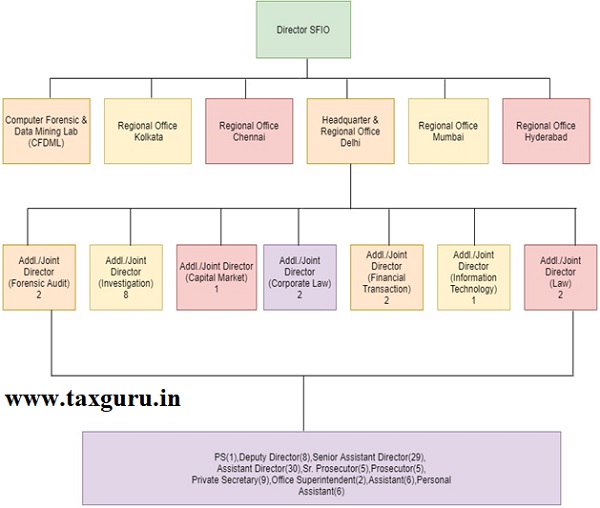I. INTRODUCTION:
The recent scams and corporate frauds (White-Collar Crimes, to be more specific) saw an enormous rise since past many years like Sahara scam, Satyam Scam, Bofors Scam, 2G Spectrum Scam. It was the time for the Government to impede such frauds which were causing heavy damage to the economy. The Government in the backdrop of major failure of non-banking financial institutions, phenomenon of vanishing companies, had decided to set up Serious Fraud Investigation Office (SFIO), a multi-disciplinary organization to investigate corporate frauds. The Organization has been established and it has started functioning since 1st October, 2003.
II. HISTORY:
The Government of India had set up a Committee on Corporate Governance under the Chairmanship of Shri Naresh Chandra, former Cabinet Secretary. The Naresh Chandra Committee inter-alia recommended setting up of Corporate Serious Fraud Office. Consequent to the recommendation of Naresh Chandra Committee and in the backdrop of stock market scams as also the failure of non-banking companies resulting in huge financial loss to the public, the Cabinet in its meeting held on 9th January, 2003, decided to set up a Serious Fraud Investigation Office (SFIO).
As per the decisions of the Cabinet, the Central Government issued a resolution on 2nd July, 2003 constituting this organisation. In continuation of the aforesaid Resolution, charter of Serious Fraud Investigation Office was issued by the Government on 21st of August, 2003 which inter alia stated that the responsibilities and functions of the SFIO.
It is a multi-disciplinary organisation consisting of experts in the field of, forensic auditing, accountancy, company law, information technology, law, investigation, taxation and capital market for prosecuting or recommending prosecuting or detecting any frauds or white-collar crimes.
SFIO is headed by a Director as Head of Department in the rank of Joint Secretary to the Government of India. The Director is assisted by Additional Directors, Joint Directors, Deputy Directors, Senior Assistant Directors, Assistant Directors Prosecutors and other secretarial staff. The Headquarter of SFIO is at New Delhi, with five Regional Offices at Mumbai, New Delhi, Chennai, Hyderabad & Kolkata
III. 1STRUCTURE OF SFIO:

1https://sfio.nic.in/Structure%20SFIO
IV. ESTABLISHMENT:
Section 211 of the Companies Act, 2013 empowers Central Government to establish an office to be called Serious Fraud Investigation Office (“SFIO”) to investigate fraud relating to a company.
The SFIO is headed by a Director, who shall be an office not below the rank of a Joint Secretary to Government of India having knowledge and experience in Corporate Affairs, and consist of expertise in the fields of investigations, cyber forensics, financial accounting, management accounting, cost accounting and any other fields as may be necessary for the efficient discharge of Serious Fraud Investigation Office (SFIO) functions under the Act.
V. TRANSFER OF INVESTIGATION, IF ANY, ALREADY PENDING:
Section 212(2) provides that once any case has been assigned by the Central Government to SFIO for investigation under the Companies Act, 2013, no other investigating agency of Central or State Government shall proceed with investigation under the Companies Act, 2013.
It further provides that if any investigation has already been initiated by any other agency of Central or State Government, it shall not proceed further with the investigation after any case has been assigned to SFIO and the concerned agency shall transfer all the relevant documents in respect of an offence under the Companies Act, 2013 to SFIO.
VI. INVESTIGATION:
Section 212 of the Companies Act, 2013 empowers Central Government to investigate into the affairs of the company by SFIO.
Investigation is made in following circumstances: – {Section 212(1)}
(a) On receipt of a report of the Registrar or inspector under section 208;
(b) On intimation of a special resolution passed by a company that its affairs are required to be investigated;
(c) In the public interest;
(d) On request from any Department of the Central Government or a State Government,
The Central Government may, by order, assign the investigation into the affairs of the said company to the Serious Fraud Investigation Office and its Director, may designate such number of inspectors, as he may consider necessary for the purpose of such investigation.
The investigation into the affairs of a company shall be conducted in the manner and by following the procedure specified in Chapter XIV of Companies Act, 2013. The SFIO shall submit its report to the Central Government within the period specified in the order. {Section 212(3)}
The Director SFIO shall cause the affairs of the company to be investigated by an investigating officer, who shall have the powers of the Inspector under section 217 of the Companies Act, 2013. {Section 212(4)}
It shall be the responsibility of the company, its officers and employees, who are or have been in the employment of the company to provide all information, explanation, documents and assistance to the investigating officer as he may require for conduct of business. {Section 212(5)}
It is important to note that the offence covered under Section 447 of the Companies Act, 2013 is a cognizable offence, wherein the inspector has the power to arrest any person without a warrant, notwithstanding anything contained in the Code of Criminal Procedure, 1973. {Section 212(6)}
VII. POWER TO ARREST:
If any officer, not below the rank of Additional Director, of SFIO has a reason to believe that any person is guilty of any offence punishable under Section 447 of the Companies Act, 2013 on basis of material in his possession, the office can arrest that person and will inform him the grounds of such arrest . {Section 212(8)}
A copy of arrest order along with the material in his possession which basis such arrest is forwarded by the concerned officer to SFIO in a sealed envelope. {Section 212(9)}
Every person arrested by the SFIO officer shall within twenty-four hours be taken to Special Court or Judicial Court or Metropolitan Magistrate, as the case may be, having appropriate jurisdiction over such matter. The period of twenty-four hours excludes the time required for journey from place of arrest to appropriate court. {Section 212(10)}
VIII. REPORT TO CENTRAL GOVERNMENT:
The Serious Fraud Investigation shall submit an interim report, if so, directed by the Central Government {Section 212(11)} and on completion of investigation, the SFIO shall submit the Investigation Report to the Central Government. {Section 212(12)}
On receipt of the Investigation Report, the Central Government will examine the report and after taking legal advice, if required, may direct SFIO to initiate proceedings against the company and its officers or employees, who are or have been in employment of the company or any other person directly or indirectly connected with the affairs of the company. {Section 212(14)}
It is important to note that the investigation report filed with the Special Court for framing of charges against any person shall deemed to be a report filed by a Police Officer under Section 173 of the Code of Criminal Procedure, 1973 {Section 212(15)}
IX. INFORMATION FROM OTHER DEPARTMENT(S):
Section 212(17) provides that if Any other investigating agency, State Government, police authority, income-tax authorities having any information or documents in respect of such offence shall provide all such information or documents available with it to the Serious Fraud Investigation Office for any offence being investigated under the Companies Act, 2013.
Further, the Serious Fraud Investigation Office shall share any information or documents available with it, with any investigating agency, State Government, police authority or income tax authorities, which may be relevant or useful for such investigating agency, State Government, police authority or income-tax authorities in respect of any offence or matter being investigated or examined by it under any other law.
It is pertinent to note that more than 80 investigations have been assigned to SFIO by the Central Government in last three years wherein approx. 600 companies were involved and the Government is taking strict action against the growing corporate frauds.
Besides the investigations that were assigned to SFIO, more than 250 investigations were assigned to Regional Directors / Registrar of Companies by the Central Government in last three years.
FREQUENTLY ASKED QUESTIONS:
Q 1. What is Serious Fraud Investigation Office and when it was established?
Ans: It is a multi-disciplinary organisation consisting of experts in the field of, forensic auditing, accountancy, company law, information technology, law, investigation, taxation and capital market for prosecuting or recommending prosecuting or detecting any frauds or white-collar crimes.
the Organisation was established by a resolution passed by the Cabinet in on July 2, 2003 and started its functioning on October 1, 2003.
Further, Section 211 of the Companies Act, 2013, has accorded statutory status to the Serious Fraud Investigation Office (SFIO) vide notification dated July 21, 2015.
Q 2. Under what circumstances, investigation into the affairs of a company is assigned to SFIO by the Government?
Ans: As per Section 212 (1) of the Companies Act, 2013, the Central Govt. may assign the investigation into the affairs of a company to the Serious Fraud Investigation Office –
(a) on receipt of report of the Registrar or Inspector under section 208;
(b) on intimation of a special resolution passed by a company requesting an investigation into its affairs;
(c) in public interest;
(d) on the request of any Department of Central Government or State Government
Q 3. What is the composition of SFIO?
Ans: The Serious Fraud Investigation Office is headed by a Director and consist of experts from different fields viz banking, corporate affairs, taxation, forensic audit, capital market, information technology, law etc.
Q 4. Can any other department investigate into the affairs of a company when any case has been assigned to SFIO by Central Government?
Ans: The case shall not be investigated by any other agency of Central or State Government once, it has been assigned to SFIO.
Q 5. What are the offences under which any person concerned can be arrested?
Ans: SFIO has power to arrest in respect of certain offences which are punishable for fraud as provided under Section 447 of the Companies Act, 2013.
Q 6. Which officer rank of SFIO has power to arrest any person under Section 447 of the Companies Act, 2013?
Ans: Director or Additional Director or Assistant Director level officers of SFIO after carrying investigation into the affairs of the company, on the basis of material/evidence in possession has reason to believe that a person is guilty of any offence with regard to the case being investigated then the officer can arrest such person.
Provided that in case the arrest is being made by Additional Director or Assistant Director, prior approval of Director, SFIO shall be obtained.
Hence, Director, SFIO shall be the competent authority for all decisions pertaining to the arrest of any person concerned.
Further, in case of a Government Company, the person concerned can only be arrested with the prior approval of Central Government.
DISCLAIMER:
The content of this document has been prepared on the basis of relevant provisions and information available. Utmost care has been taken to ensure the accuracy, completeness and reliability of the information provided since data provided herein has been obtained from the Companies Act, 2013 and from the website of Serious Fraud Investigation Office. Author assume no responsibility thereof.
In NO EVENT, the author shall be liable for any direct or indirect, special or incidental damage resulting from or arising out of or in connection with the use of the information provided in the article.
This article is not an advice or opinion, it is just a knowledge sharing initiative





